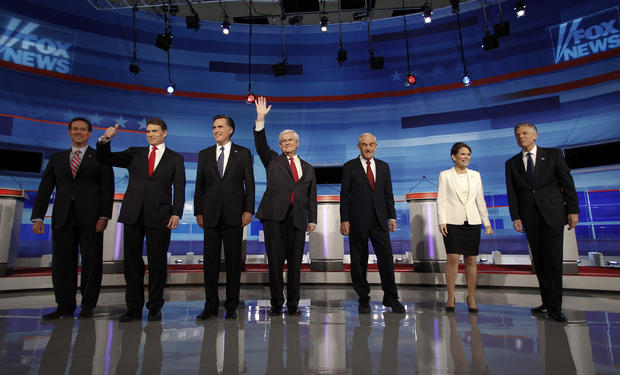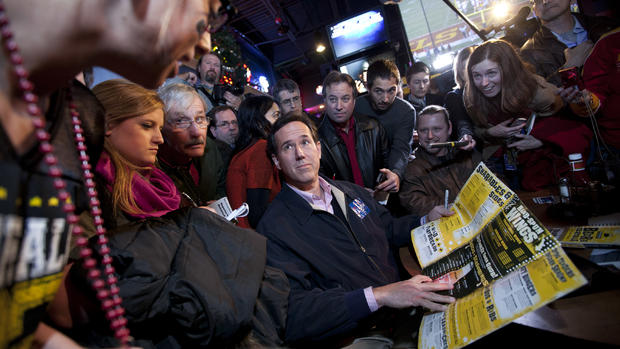New Republican delegate rules: What it means for the GOP race
After seeing the long fight between Senators Barack Obama and Hillary Clinton for the Democratic nomination in 2008, Republicans decided longer contests could pay dividends -- that '08 campaign left behind a lot of activated and newly registered voters.
So the GOP changed the way some of its primaries work - states that hold events prior to April 1 were asked to award their delegates more proportionally, instead of winner-take-all. In theory, that opens more chances for second- and third- place candidates to get delegates, and perhaps hang in the race.
But how much might the new rules impact things? There's a difference between a nomination that's really contested for a while, and one that just takes longer for the leader to clinch. The latter is more a political question. In terms of the allocation math for 2012, the Vince Lombardi rule still holds: winning matters. Here's why:
First: Even though a state may allocate its delegates "proportionally," that doesn't guarantee its delegate count will be close
Many of the "proportional" states still give better opportunities to the overall winner.
For example: In Georgia on Super Tuesday, some of the delegates are awarded based on the vote within the congressional districts (This is the case in many states). The winner in each district gets a minimum of two out of three of the district's delegates just for winning it, and captures all three if he or she crosses 50 percent of that district's vote.
Naturally, it's easy to imagine that a statewide winner could carry a bulk of the districts within that state. Moreover, there's a minimum threshold of vote that cuts off lesser candidates from delegates, also a common element in many states. Virginia, also on Super Tuesday, is proportional, but if a winner surpasses 50 percent of the vote they still get all the state's at-large delegates anyway. Summary: Winning, especially winning big, pays off.
Two: Some early states are still winner-take-all -- and if anyone wins a string of early contests they'll build an (admittedly, small) delegate lead too, as well as momentum
South Carolina and Florida are still winner take all, based on their current plans. A single winner of both would get 75 delegates, a relatively decent haul coming out of January, considering New Hampshire (which is proportional) only has 12, and Iowa formally awards none at the caucuses. Later in February, Nevada is proportional, but Arizona is winner take all, too.
Three: Don't forget South Carolina... it always has something to say about this
South Carolina has usually been the "tiebreaker," correctly predicting every GOP nominee since 1980 and every Democrat since 1992. And Florida right behind it makes this a potential one-two punch. If it isn't, that'll really buck history.
The idea of early state momentum - even, inevitability -- makes sense if you think about it. Voters often ask themselves whether their vote can be determinative in an outcome - i.e., whether a candidate has a chance to win (in this case, the nomination).
Winning primaries confers viability, so it is no surprise we see early primaries at least winnow a field if not anoint a winner, especially when a candidate wins unexpectedly somewhere or proves themselves among a voter group outside his base. Famously, for example, Barack Obama winning the Iowa caucuses seemed to send a powerful signal to Democratic voters elsewhere about a then-untested African American candidate; JFK's performance in West Virginia in 1960 was also seen as a test of whether Protestant voters could put aside his Catholicism.
Conversely, a weak showing in a state that was a hotly contested or where expectations were high can spell doom for a candidate - like Mitt Romney's poor showing in Iowa in 2008.
And that's not even mentioning the other benefits of attention and fundraising that can start a "steamroll." Momentum drives fundraising, which drives ads and staffing, which drives poll numbers which drive better finishes in states, which drives momentum... and the perpetually self fulfilling prophecy continues.
Four: A long nomination fight, if it happens, could result as much from the calendar and differing state winners as from the delegate rules
The calendar is different now from 2008 - there were more contests on Super Tuesday last time, and Super Tuesday was earlier in February, instead of March 6 as it is now. So in terms of real time, things could take longer now to decide by virtue of there being more contests occurring later. In fact, there are few delegates available in February because there are not many events then.
Once we get to April, when large states may use more winner-take-all plans, things could snowball for a delegate leader in a hurry. Conversely, as some have wisely noted, this would also make it mathematically possible for a late entry to come in and get delegates, or for a three way race to emerge, but that involves other issues like ballot access and money. The length of the season itself could reward the candidate with the best infrastructure and the most money.
With slightly different constituencies and voting rules (some open primaries, some closed, some caucuses) within the states, it is often the case that a contested nomination means different candidates target and win in different states. You see this already in the early states with different polling leaders between Iowa and New Hampshire. We saw it in 2008 when Mike Huckabee won some contests in the south even while John McCain was en route to winning elsewhere. That kind of scenario could keep a fight alive as much as a slow grinding of delegates, if the final two or three candidates have different regional or voting bloc appeals.
But they still need to win somewhere. By March, even a consistent second-place finisher with no wins to their credit would be like getting a bunch of silver medals at the Olympics -- impressive, but it won't likely get you on the cereal box.
Iowa Debate: Republican Winners and Losers
Romney praises Medicare overhaul proposal
Rick Perry hopes to be the Tim Tebow of Iowa caucuses
Gingrich, Paul challenge electability questions


